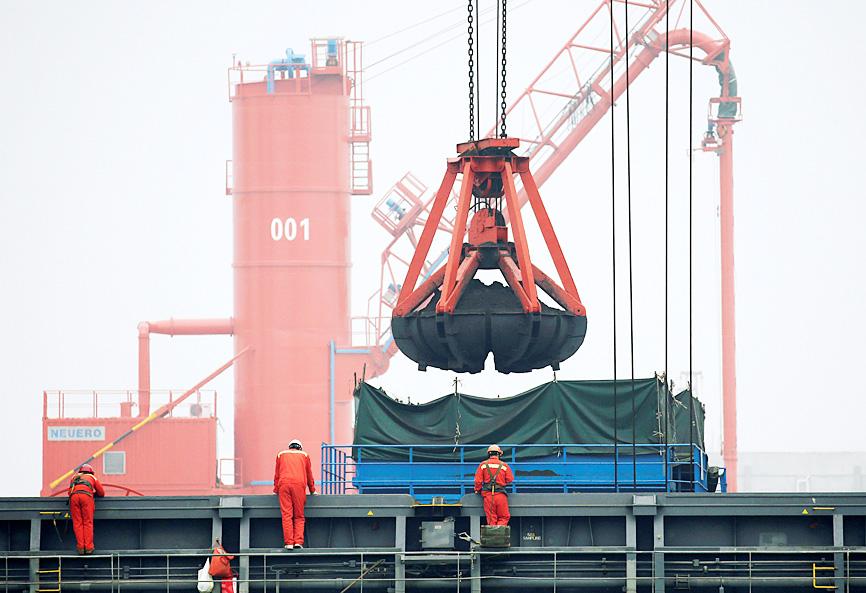More than US$500 million of Australian coal is on ships anchored off Chinese ports, as a diplomatic spat between the two countries cuts into trade, idles a portion of the world’s dry-bulk carriers and threatens to spiral into a humanitarian crisis.
More than 50 vessels have been waiting a month or longer to offload coal from Australia, according to separate analyses of shipping data conducted by Bloomberg and data intelligence firm Kpler SAS.
There are about 5.7 million tonnes of coal on the anchored ships, which are mostly cape and Panamax-sized vessels, with about 1,000 crew, Kpler data showed.

Photo: Reuters
The cargo and crew are victims of China’s move to blacklist a wide swathe of Australian commodities and foodstuffs, ratcheting up tensions between the two trading partners that have deteriorated since Huawei Technologies Co (華為) was in 2018 barred from building Australia’s 5G network.
Chinese power stations and steel mills were told to stop using Australian coal and ports were instructed not to offload the fuel, Bloomberg News reported last month.
“Aussie coal producers might be looking at other destinations for coal, such as Japan or India, but given the quantum of impact, they will likely trim down production as well,” said Abhinav Gupta, a research analyst at Braemar ACM Shipbroking. “This is leading to seafarers being stuck on ships outside of their contractual obligation, a situation that was started by the pandemic.”
A total of 66 vessels loaded with Australian coal are in Chinese waters, according to shipping data analyzed by Bloomberg, with most of them off the northeast coast near the ports of Jingtang and Caofeidian.
Meanwhile, Kpler identified 53 vessels holding Australian coal waiting about four weeks or longer to discharge at Chinese ports.
Thirty-nine of the ships are carrying about 4.1 million tonnes of metallurgical coal, while nine are carrying about 1.1 million tonnes of thermal coal, Kpler data showed.
Another five vessels were carrying types of coal that were not identified, it showed.
Australian coking coal traded at about US$101.57 a tonne in Singapore on Monday, while thermal coal traded at about US$63.40 on ICE Futures Europe.
Assuming that the unidentified cargoes were the cheaper of the two types, the value of coal on the vessels identified by Kpler is approximately US$519 million.
Ships carrying coal from all exporters generally waited three to five days for a berth prior to China’s restrictions on Australian shipments, Kpler data showed.
The flotilla of vessels waiting to offload is also tightening the fleet supply in the region, Gupta said.
There were 133 dry bulk vessels waiting to discharge at Chinese ports in the middle of this month, 59 of which had been waiting for 20 days or more, BIMCO said in report released on Tuesday, citing ship-tracking data from VesselsValue.
Chinese officials have blamed Australia’s “cold-war mentality” for worsening relations between the nations, adding that its trade actions are consistent with WTO rules.
Chinese Minister of Foreign Affairs Wang Yi (王毅) earlier this month acknowledged the plight of one vessel, saying that Beijing had not restricted it from leaving and the situation was down to the freight forwarder’s commercial interests.

Hong Kong authorities ramped up sales of the local dollar as the greenback’s slide threatened the foreign-exchange peg. The Hong Kong Monetary Authority (HKMA) sold a record HK$60.5 billion (US$7.8 billion) of the city’s currency, according to an alert sent on its Bloomberg page yesterday in Asia, after it tested the upper end of its trading band. That added to the HK$56.1 billion of sales versus the greenback since Friday. The rapid intervention signals efforts from the city’s authorities to limit the local currency’s moves within its HK$7.75 to HK$7.85 per US dollar trading band. Heavy sales of the local dollar by

To many, Tatu City on the outskirts of Nairobi looks like a success. The first city entirely built by a private company to be operational in east Africa, with about 25,000 people living and working there, it accounts for about two-thirds of all foreign investment in Kenya. Its low-tax status has attracted more than 100 businesses including Heineken, coffee brand Dormans, and the biggest call-center and cold-chain transport firms in the region. However, to some local politicians, Tatu City has looked more like a target for extortion. A parade of governors have demanded land worth millions of dollars in exchange

Taiwan Semiconductor Manufacturing Co’s (TSMC, 台積電) revenue jumped 48 percent last month, underscoring how electronics firms scrambled to acquire essential components before global tariffs took effect. The main chipmaker for Apple Inc and Nvidia Corp reported monthly sales of NT$349.6 billion (US$11.6 billion). That compares with the average analysts’ estimate for a 38 percent rise in second-quarter revenue. US President Donald Trump’s trade war is prompting economists to retool GDP forecasts worldwide, casting doubt over the outlook for everything from iPhone demand to computing and datacenter construction. However, TSMC — a barometer for global tech spending given its central role in the

The Financial Supervisory Commission (FSC) yesterday met with some of the nation’s largest insurance companies as a skyrocketing New Taiwan dollar piles pressure on their hundreds of billions of dollars in US bond investments. The commission has asked some life insurance firms, among the biggest Asian holders of US debt, to discuss how the rapidly strengthening NT dollar has impacted their operations, people familiar with the matter said. The meeting took place as the NT dollar jumped as much as 5 percent yesterday, its biggest intraday gain in more than three decades. The local currency surged as exporters rushed to